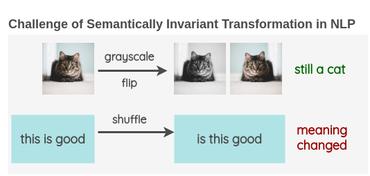Search Results for author: Zhichao Huang
Found 14 papers, 6 papers with code
Sentiment Interpretable Logic Tensor Network for Aspect-Term Sentiment Analysis
no code implementations • COLING 2022 • BoWen Zhang, Xu Huang, Zhichao Huang, Hu Huang, Baoquan Zhang, Xianghua Fu, Liwen Jing
SILTN is interpretable because it is a neurosymbolic formalism and a computational model that supports learning and reasoning about data with a differentiable first-order logic language (FOL).
EDDA: A Encoder-Decoder Data Augmentation Framework for Zero-Shot Stance Detection
1 code implementation • 23 Mar 2024 • Daijun Ding, Li Dong, Zhichao Huang, Guangning Xu, Xu Huang, Bo Liu, Liwen Jing, BoWen Zhang
To address these issues, we propose an encoder-decoder data augmentation (EDDA) framework.
Speech Translation with Large Language Models: An Industrial Practice
no code implementations • 21 Dec 2023 • Zhichao Huang, Rong Ye, Tom Ko, Qianqian Dong, Shanbo Cheng, Mingxuan Wang, Hang Li
Given the great success of large language models (LLMs) across various tasks, in this paper, we introduce LLM-ST, a novel and effective speech translation model constructed upon a pre-trained LLM.
RepCodec: A Speech Representation Codec for Speech Tokenization
1 code implementation • 31 Aug 2023 • Zhichao Huang, Chutong Meng, Tom Ko
To improve the performance of these discrete speech tokens, we present RepCodec, a novel speech representation codec for semantic speech tokenization.
Fast Adversarial Training with Adaptive Step Size
no code implementations • 6 Jun 2022 • Zhichao Huang, Yanbo Fan, Chen Liu, Weizhong Zhang, Yong Zhang, Mathieu Salzmann, Sabine Süsstrunk, Jue Wang
While adversarial training and its variants have shown to be the most effective algorithms to defend against adversarial attacks, their extremely slow training process makes it hard to scale to large datasets like ImageNet.
Black-box Prompt Learning for Pre-trained Language Models
1 code implementation • 21 Jan 2022 • Shizhe Diao, Zhichao Huang, Ruijia Xu, Xuechun Li, Yong Lin, Xiao Zhou, Tong Zhang
Particularly, instead of fine-tuning the model in the cloud, we adapt PLMs by prompt learning, which efficiently optimizes only a few parameters of the discrete prompts.
On the Impact of Hard Adversarial Instances on Overfitting in Adversarial Training
no code implementations • 14 Dec 2021 • Chen Liu, Zhichao Huang, Mathieu Salzmann, Tong Zhang, Sabine Süsstrunk
This lets us show that the decay in generalization performance of adversarial training is a result of the model's attempt to fit hard adversarial instances.
Improving Adversarial Defense with Self-supervised Test-time Fine-tuning
no code implementations • 29 Sep 2021 • Zhichao Huang, Chen Liu, Mathieu Salzmann, Sabine Süsstrunk, Tong Zhang
Although adversarial training and its variants currently constitute the most effective way to achieve robustness against adversarial attacks, their poor generalization limits their performance on the test samples.
Few-Shot Human Motion Transfer by Personalized Geometry and Texture Modeling
1 code implementation • CVPR 2021 • Zhichao Huang, Xintong Han, Jia Xu, Tong Zhang
We present a new method for few-shot human motion transfer that achieves realistic human image generation with only a small number of appearance inputs.
CorrAttack: Black-box Adversarial Attack with Structured Search
no code implementations • 3 Oct 2020 • Zhichao Huang, Yaowei Huang, Tong Zhang
We show that searching over the structured space can be approximated by a time-varying contextual bandits problem, where the attacker takes feature of the associated arm to make modifications of the input, and receives an immediate reward as the reduction of the loss function.
Prototype Completion with Primitive Knowledge for Few-Shot Learning
1 code implementation • CVPR 2021 • Baoquan Zhang, Xutao Li, Yunming Ye, Zhichao Huang, Lisai Zhang
To avoid the prototype completion error caused by primitive knowledge noises or class differences, we further develop a Gaussian based prototype fusion strategy that combines the mean-based and completed prototypes by exploiting the unlabeled samples.
Stochastic Recursive Gradient Descent Ascent for Stochastic Nonconvex-Strongly-Concave Minimax Problems
no code implementations • NeurIPS 2020 • Luo Luo, Haishan Ye, Zhichao Huang, Tong Zhang
We consider nonconvex-concave minimax optimization problems of the form $\min_{\bf x}\max_{\bf y\in{\mathcal Y}} f({\bf x},{\bf y})$, where $f$ is strongly-concave in $\bf y$ but possibly nonconvex in $\bf x$ and ${\mathcal Y}$ is a convex and compact set.
Black-Box Adversarial Attack with Transferable Model-based Embedding
1 code implementation • ICLR 2020 • Zhichao Huang, Tong Zhang
We present a new method for black-box adversarial attack.
Hessian-Aware Zeroth-Order Optimization for Black-Box Adversarial Attack
no code implementations • 29 Dec 2018 • Haishan Ye, Zhichao Huang, Cong Fang, Chris Junchi Li, Tong Zhang
Zeroth-order optimization is an important research topic in machine learning.




